After nine years on City Council, and much recent speculation as to his future plans, Councilor Dave Marshall announced his intentions, “I will not be seeking reelection to City Council this year.”
Dave made the announcement in an exclusive interview with WEN editor Tony Zeli. The interview took place at Dave Marshall’s home on Pine Street. Dave shared his take on his own successes, his mistakes, and his role in controversial issues such as the Maine State Pier redevelopment, marijuana legalization and the popularly elected mayoral position.
TZ: Why now?
DM: This is my ninth year serving as the District Two City Councilor. I feel I have made a lot of accomplishments over the years. I have enjoyed my time serving my constituents. I am now interested in spending more time with my wife, Whitley, and spending more time on different entrepreneurial efforts.
I can always get back into public office again if I choose to, but I am ready to take a break right now.
TZ: So you’re not going to run for Mayor?
DM: No, no. I’ll let the other City Councilors run for Mayor.
TZ: It’s been nine years. How have you seen the Council change over that time?
DM: Probably about half the seats on the Council have changed. Mavadones and Duson are the only one’s left that were on the Council before I was elected.
There is a big difference in the characters that are involved. When Councilor Leman left it shifted things on the Council to be generally more progressive; however, there are a lot of political divisions among Councilors.
Nobody is coming to the table with five votes behind them. Most tough decisions are made on the Council floor with a lot of undecided votes, and without a lot of people knowing what is about to occur.
The last budget vote was very indicative of that. Going into it nobody knew what the outcome would be.
It hasn’t always been like that on the City Council. There was a time when the Council had its mind made up before any issue came before it. Now, it seems as though there is such a variety of opinion amongst Councilors that it is a really dynamic time.
TZ: What was your most controversial decision?
DM: I dunno.There’s been a lot of controversial decisions that I’ve been a part of. But certainly the Maine State Pier was one of my introductions to government, and that was probably most highlighted by the fact that the Council deadlocked four-four on a key development.
There were two developers, the Council was divided, and it took an election to break that stalemate. A year after that the economy changed and both projects ultimately went away. Now the Maine State Pier is being used for lobster processing and other marine related activities.
In the end of the day, we realized after the fact, that the work that needed to be done on the pier was not as extensive as we thought. The $20 million dollar price tag was more about providing the foundation for the pier in order to support a $100 million development than it was necessarily about fixing the pier. The divers came up and said the pillions weren’t as bad as we originally thought, so the Council took care of it in the next capital budget.
Because of the deadlock that occurred, and the media attention over the fact that former US Senate Majority Leader George Mitchell was involved — and a lot of other big political actors, like Bob Baldacci — that really raised the stakes for the media.
TZ: Were you able to achieve the things that you originally ran to achieve?
DM: The first time I ran, my platform was: improve policing, preserve neighborhood schools… and housing was a key part of it. Produce more housing, improve policing and preserve our neighborhood schools.
We’ve been able to preserve most of our neighborhood schools. Nathan Clifford was consolidated, and that neighborhood school was lost. But for the most part we’ve been able to preserve neighborhood schools.
We’ve done a lot of work and put a lot of resources into Reiche School to improve the playground, basketball courts, a new heating system and all new windows. There is still improvements that need to be made, but the school looks a lot better now than it did nine years ago.
The crime rate has gone down, and lot of that had to do with the Police and the neighbors — people being willing to put in extra effort to see Portland prosper.
As far as creating more housing, we’ve been able to make pretty good progress on that. We certainly are not meeting the demand. There is a very low vacancy rate in Portland, as there has been for over a decade, and the cost of housing is going up.
But we’ve started to see the first market rate housing developments occur in this City since the zoning code went into place, probably in the sixties.
The development at Pine and Brackett which was put together by Redfern and Jonathan Culley was the first market rate apartment building to built in the city without government subsidy. Now we are starting to see a lot more market rate apartment buildings.
We’ve seen a steady influx of affordable housing units over the years, and we certainly need more, because Portland is becoming an exclusive City.
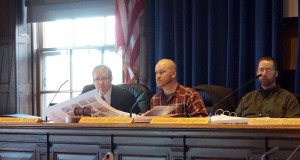
Dave Marshall chairing a Transportation, Sustainability and Energy Committee hearing. Councilors Hinck and Donoghue also pictured.
The Council has embraced a lot of zoning reforms that I advocated for, and I think those zoning reforms will allow for more in-fill development. Smaller buildings that can match the character and scale of the neighborhood. That is where the opportunities are for housing developments.
Then in the downtown we have a lot of very prime for development parking lots that could hold larger scale housing developments.
Any time you get into government, you start your work and your work carries on… Whether through adopting comprehensive plans, making zoning changes, or whatever policies might pass.
Through the committees I have chaired, we’ve seen green building codes, fees put on plastic bags, bans on polystyrene. Those are all policies that have moved through. Though controversial, and may make it a little more difficult to do business here, I think they are necessary sacrifices in order to make sure the values of the City are carried forth and we can achieve our other goals around environmental policy.
TZ: How did a young artists and member of a third party get elected?
DM: I knocked on a lot of doors and worked extremely hard. By the time my opponents got into the race, I had already gone around the district one time.
I was out spent by one of my opponents by a four to one margin, but I was able to win with about 8% of the vote. I simply out-worked my opponents. I called more people, knocked on more doors and I wrote more postcards.
I remember a week before the election, I dropped a stack of postcards that I wrote to every person who had promised to vote for me… It was a stack of about 6 inches, and I knew that when I dropped that off in the mailbox that I was going to win.
Running for office and getting elected is a lot different than governing. Once you get elected you are in a position where you have to learn to govern. And there is a really high learning curve to it. I can say it was a lot more challenging than anything I attempted in college. It was probably the best education that I ever received.
TZ: What do you see as your biggest accomplishment?
DM: At the end of the day, it is going to be the zoning reforms that will allow for people to build in a way that matches the already built environment.
We did a lot of zoning changes to all the business zones, and we recently completed the R6 zone. Those zoning reforms are gong to do a lot to improve the City’s ability to meet its housing goals.
The main challenge for the City still remains to be the lack of housing that is available. That is driving the cost of living increases, and Portland is becoming more a more exclusive city as a result of it.
I saw that as a major challenge for the City 10 years ago, and the reforms we have made will help bring forth a new era of housing and development that is critical for the growth and prosperity of the city.
Portland used to be a city of 80,000 people and today we are a city of 66,000 people… We need to grow back into the proper size so that we will have the people and the tax base to support the infrastructure that we have — that we bear for the benefit of everybody who lives in the region and who visits Portland from throughout the State and throughout the world.
TZ: Are there other policies that you were involved with that you would consider important achievements?
DM: Reforms to our transportation infrastructure in order to encourage and to allow for more equitable use of our roadway by all modes of transit.
And then… I would say the development of the Creative Economy TIF district and Creative Portland, and the work that has been done in order to support artists and other creatives in the city using that funding structure there.
It was a policy I came up with just before running for office. I actually wrote a letter to the editor in the West End News about the Arts District TIF concept and creating a funding mechanism before I ran in 2016.
That really built a lot of confidence with the relation between artists and creatives and the City. The City, during the recession, really stepped up and provided funding to the organization and the programs, while other communities were cutting back their funding…
The transformation of Congress Street into the Arts District, which has really happened over the last decade or so, has gone a long way to improving the quality of the downtown and the city in general.
TZ: What was your biggest mistake? Any votes that you would take back?
DM: We had a vote on whether to accept state funding for a new school [Ocean Avenue School]. I was one of three to vote against it, but because it was set up as a bond it needed seven votes for passage. So it failed.
Looking back, I made the wrong decision on that. I eventually made the right decision by reconsidering my vote at the next meeting, but at that point it was an exercise in futility. I should have just excepted that, although not perfect, it was where the City was going, and move forward with it instead of making a last ditch effort to try and change it. I learned a lot from that experience.
TZ: What’s pot got to do with it?
DM: Obviously I took a leadership role in advancing marijuana legalization in the city. It was a first step towards getting the conversation going statewide, and it worked quite well.
Now there is not only one but two citizen initiative petitions circulating, and it looks as though they both are on pace to get on the ballot for 2016. So I can say that it had the effect of bringing people forward to take the issue seriously.
It is a shame that we have created this situation where the penalty for having a substance is more damaging than the substance itself. Even though we are in a state that calls possession a misdemeanor, it still goes on your background as a federal drug offense and can negatively impact people’s lives in terms of housing and jobs.
It’s time for us to embrace cannabis as a medicine that can help out many people, and to take and change our rules to take criminal penalties away for folks to possess it and cultivate it.
Just like with alcohol prohibition — Maine played a big role in that, particularly with Neal Dow, whose mansion is about two blocks from here. Prohibition of alcohol didn’t work, and prohibition in general as a policy doesn’t work. The key is that we need to find a way to accept it, and to bring in the tax revenues.
TZ: Any advice for whoever might be the next City Councilor for District Two?
DM: Be prepared to put in a lot of hours in order to do it well. There is a huge demand on City Councilors to meet the needs of constituents in any district.
In the second district it is particularly dynamic due to the broad diversity in socio-economics and race and every other characteristic.
You also have a lot of large institutions like hospitals and universities. Because of the proximity to downtown there is a lot of developments that occur.
Also, politically speaking it is a very active part of the city. Constituents are not shy to push agendas, either through the courts or thought the ballot box.
Those that lead the district need to be constantly in touch and in tune with the vibe of the district and where their constituents are at. That is the key for surviving for several terms in the second district.
TZ: Any endorsements?
DM: I don’t thing the papers are even out yet… so I’m going to hold my endorsement until I actually know who all the candidates are going to be.
TZ: You pushed to have a popularly elected mayor. We have had Mayor Brennan serve in that position for four years. Did that go the way you wanted it to go?
DM: I was interested in having a strong mayor in the City of Portland. I believe that having a strong leader with the ability to move the government would bring Portland to a new level of prosperity.
The great thing about City government is that we have a lot of specialists who help out in all these different areas. We need big vision leadership that can be complimented with specialities.
What we ended up getting was a compromise, which is a popularly-elected mayor who had pretty limited amount of powers. It is really just a super-councilor with lots more time.
The best thing that has come from it is the long-term continuity, having a leader for four to eight years. Prior to that we changed the head of the city every year.
It is going to take more time to really understand how well it is working, or if it isn’t working.
Certainly, all leaders have their faults. Some leaders might handle this position differently than others.
It might at some point be necessary to look at the charter again to see if the proper balance of powers are there. But at this point in time I think it would be good to see how a couple different mayors could utilize the position. I this point we have only really seen most of one term from one mayor.
TZ: When you ran for Mayor it was the City’s first use of ranked-choice voting. When you were eliminated after many rounds, many of your supporters went to Mike Brennan.
DM: Yeah, a lot of supporters did go to Mike Brennan.
I can say that I like Mike a lot. He’s been good to work with. Even when we had big differences, we always agreed to sit down and work things out.
I remember the day after the Congress Square Park referendum passed, and the City was on the losing side. I worked really hard to make sure that referendum passed.
Mike and I were at odds, but after we yelled at each other for a while, we agreed to sit down for lunch the next day.
It took a long time to get on the same page with that issue, but I can say that he was always willing to sit down and talk and try to work things out. When other issues came up, he didn’t hold it against me that we were at odds on different issues.
Out of all the candidates who are running, Mike has the best chance of doing a good job with the position.
TZ: Where can people expect to see you now that you won’t be at City Hall all the time?
DM: I’ll still be at the Farmers Marker on Wednesdays and Saturdays doing my street art. I’ll be around the West End, for sure.

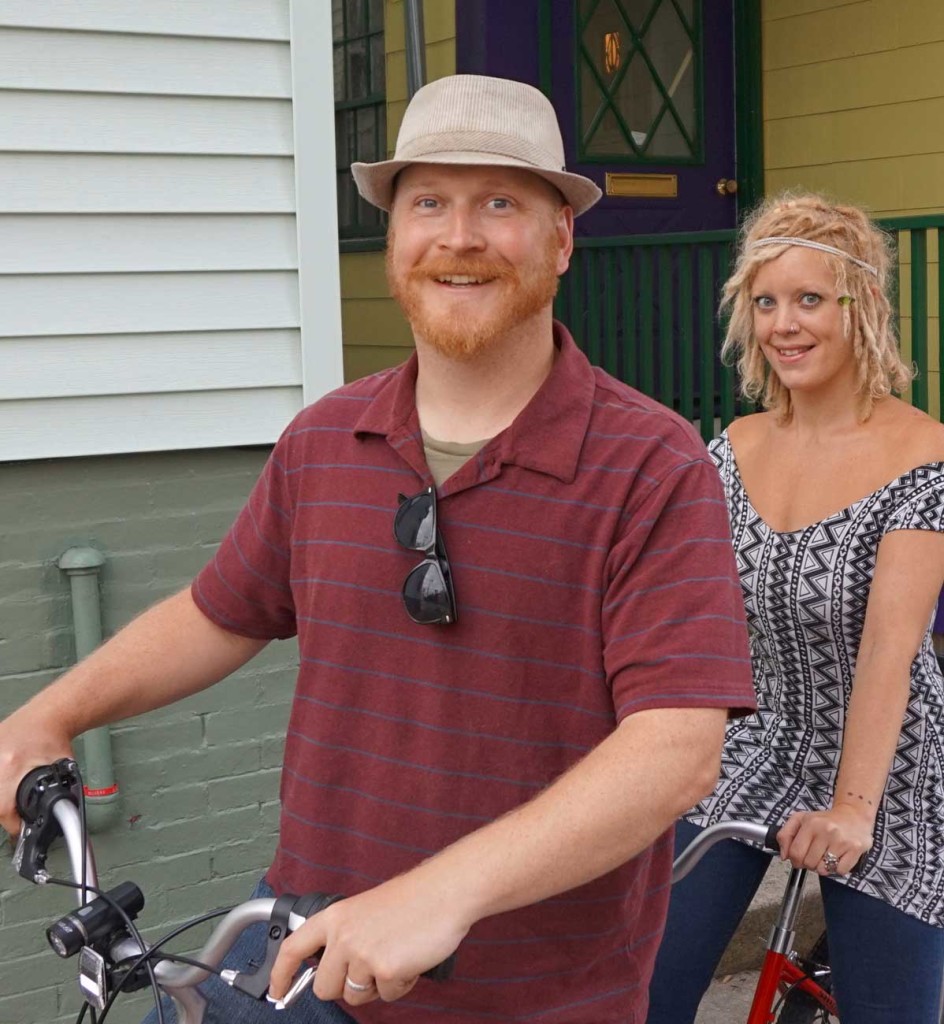
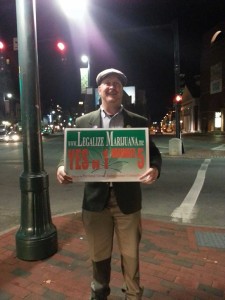
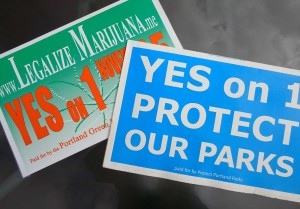

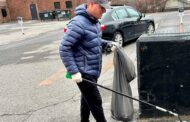



2 Comments
Cliff Gallant
Renaissance men don’t fade away, they just do something else for awhile.